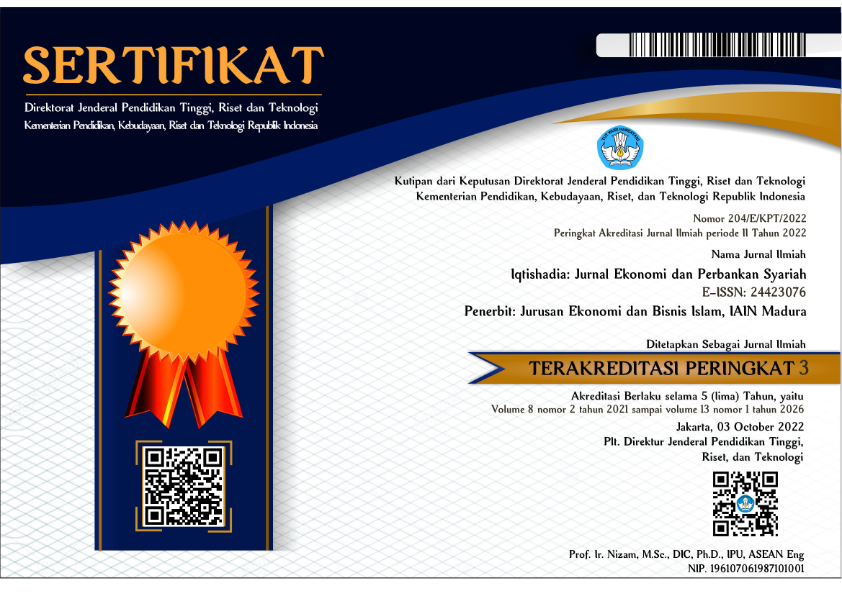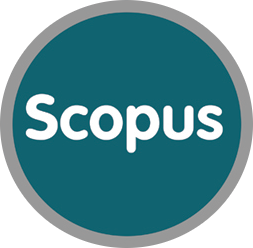Creative Economy Development Challenges for Halal Tourism: A Study in Madura, Indonesia
 Abstract views: 447
,
Abstract views: 447
,
 PDF downloads: 357
PDF downloads: 357
Abstract
Indonesia is a country that has potential in the tourism sector. In the context of creative economy-based tourism, Sumenep, one of the districts in Madura, has the potential to be optimally developed. However, issues such as the production of sharia-compliant products, raw materials and product marketing have become challenges for creative economy entrepreneurs in this region. This study was conducted to closely examine the development of the creative economy for halal tourism in Sumenep by focusing on the real challenges faced by creative economy entrepreneurs, especially in the handicraft sector. The data collected was then analyzed using thematic analysis. The analysis resulted in three main findings. First, implementing a creative economic development concept for halal tourism must be in line with the Halal Tourism Development Development Acceleration Team (TP3H) criteria. Second, nine challenges faced by creative economy entrepreneurs in Sumenep are the quality and quantity of human resources, capital, sharia-compliant products, competitors from outside the region, raw materials, marketing strategies, information and technology infrastructure, and Government policy. Competitors from outside the area are the main challenge faced by Sumenep's creative economy entrepreneurs. Third, training strategies, venture capital assistance, product innovation, marketing systems development, business partnerships, and the establishment of consulting and development centres could be implemented to deal with these challenges, with the cooperation of entrepreneurs and the government
Downloads
References
Anandhyta, A. R. (2020). Hubungan Tingkat Partisipasi dengan Tingkat Kesejahteraan Masyarakat dalam Pengembangan Wisata Pesisir. 12(Iv).
Andariesta, D. T., & Wasesa, M. (2021). Machine learning models for predicting international tourist arrivals in Indonesia during the COVID-19 pandemic : a multisource Internet data approach. Journal Of Tourism Futures, 1–17. https://doi.org/10.1108/JTF-10-2021-0239
Anggaran, T., Urusan, U., Kegiatan, P., & Jasa, B. (2013). Manajemen Komunikasi Dinas Pariwisata Kebudayaan, Kepemudaan Dan Olahraga Dalam Mengembangkan Potensi Desa Wisata Di Kabupaten Bengkalis. Komunikasi, XIII(2010), 1–55.
Arifin, S. (2017). Digitalisasi pariwisata madura. Komunikasi, IX(1), 53–60.
Badriyah, N., Chawa, A. F., Nur, M., Arawindha, & Ucca Kusumastuti, A. (2022). Peningkatan Ekonomi Masyarakat Pesisir Melalui Inovasi. Jurnal Ilmiah Mandala Education (JIME), 8(2), 1260–1269.
Boğan, E., & Sarıışık, M. (2019). Halal tourism : conceptual and practical challenges. Journal of Islamic Marketing.
Budiyanti, E., & Budiyanti, E. (2011). Perkembangan Pasar Modal Dan Pertumbuhan Ekonomi Di Indonesia : Analisis Vector Autoregressions ( VAR ). Jurnal Ekonomi & Kebijakan Publik, 2(2), 707–728.
Cemporaningsih, E., Titi, D., Pariwisata, P., & Kledung, K. (2020). Ekonomi Kreatif sebagai Poros Pengembangan Pariwisata di Kecamatan Kledung dan Bansari, Kabupaten Temanggung. Jurnal Nasional Pariwisata, 12(September), 106–125.
Farida, Zulaikha, Putro, & Eko, H. (2020). Desentralisasi Wisata Religi Indonesia Melalui City Branding Wisata Kabupaten Bangkalan Madura Decentralization of Indonesian Religious Tourism Trough City Branding of Bangkalan Madura Regency. Bricolage : Jurnal Magister Ilmu Komunikasi, 6(2), 223–234.
Haque, M. I., Ahmad, S., & Azad, M. S. (2020). Mapping of scientific literature on Islamic Economics, Banking and Finance 1955 to 2020. Library Philosophy and Practice, 2020, 1–29.
Hariyati, J. R., Hakim, L., & Batoro, J. (2022). Ethnobotany of Homegarden in The Island of Gili Iyang , Sumenep Regency. Journal of Indonesian Tourism and Development Studies, 10(2), 65–73. https://doi.org/10.21776/ub.jitode.2022.010.02.02
Hasan, Z. (2021). Making Indonesia as Integrated Halal Zone and World Halal Sector Hub Through the Implementation of Halal Supply Chain. Journal of Islamic Economic and Business Research, 1(1), 1–14. https://doi.org/10.18196/jiebr.v1i1.11529
Hasan, Z. (2022). Prospect of Islamic Electronic Money in Indonesia : Case Study on the LinkAja Application. Jurnal Ekonomi Syariah Indonesia, XII(1), 1–13.
Hasan, Z., Sutiono, R., Junita, R., & Jayanti, E. D. (2021). Reflecting on Gmti and Imti in Assessing Halal Tourism Performance in Indonesia To Strengthen National Halal Industry. Journal of Islamic, Social, Economics and Development (JISED), 6(39), 326–343. http://www.jised.com/PDF/JISED-2021-39-09-30.pdf
Iswahyudi, H. (2021). The persistent effects of COVID-19 on the economy and fiscal capacity of Indonesia. 29(2), 113–130. https://doi.org/10.14203/JEP.29.2.2021.113-130
Lemy, D. M., Teguh, F., & Pramezwary, A. (2019). Tourism Development in Indonesia. Delivering Tourism Intelligence.
Ma, A., & Wihastuti, L. (2008). PERTUMBUHAN EKONOMI INDONESIA : Determinan dan Prospeknya. 9(April), 44–55.
Mohd, M. B., & Ismail, N. (2016). Halal tourism: Concepts, practises, challenges and future. Tourism Management Perspectives, 19.
Nisthar, Sainudeen, & Mustafa, A. M. M. (2019). An Econometric Analysis of Global Muslim Travel Index: A Study on the Perspectives of Permitted Tourism Industry in the Global Context. International Journal of Economics and Financial, 2017(December 2017). https://doi.org/10.32479/ijefi.8537
Nugroho SBM. (2020). Beberapa Masalah Dalam Pengembangan Sektor Pariwisata Di Indonesia. Pariwisata, 7(2), 124–131.
Nurhayati, A. (2010). Revisiting Pariwisata Madura ; Karsa, XVIII(2).
Pauline J. Sheldon. (2022). The coming-of-age of tourism : embracing new economic models. JOURNAL OF TOURISM FUTURES, 8(2), 200–207. https://doi.org/10.1108/JTF-03-2021-0057
Policy, I. (2021). The Effect of Electricity Development in Indonesia on Poverty and Income Inequality. 22(1), 104–116. https://doi.org/10.23917/jep.v22i1.
Pratiwi, M. I. (2020). Dampak Covid-19 Terhadap Perlambatan Ekonomi Sektor Umkm. Jurnal Ners, 4(2), 30–39. https://doi.org/10.31004/jn.v4i2.1023
Priyono, N., Arifah, S., Wulandari, E., & Prasetyanto, P. K. (2020). The Determinants of Level of Society Welfare Within Fiscal Decentralization Framework in Regional Autonomy Era. 21(2), 60–70. https://doi.org/10.23917/jep.v21i2.10545
Putri, E., Praswati, A. N., Muna, N., & Sari, N. P. (2022). E-Finance Transformation : A Study of M-Wallet Adoption in Indonesia. 23(1), 123–134. https://doi.org/10.23917/jep.v23i1.15496
Raharjana, D. T., Shri, H., & Wisata, D. (2020). Penguatan SDM dalam e-Marketing untuk Promosi Desa Wisata di Kabupaten Malang. 12, 140–151.
Rahmayani, D., Oktavilia, S., & Putri, P. I. (2021). The Impact of Covid-19 Pandemic on Inflation in Indonesia. 22(2), 117–128. https://doi.org/10.23917/jep.v22i2.13861
Rini, D. A. S., Pratikto, W. A., & Sambodo, K. (2015). Identifikasi potensi kawasan sumberdaya pulau kangean kabupaten sumenep madura sebagai kawasan wisata bahari. Jurnal Kelautan, 8(2), 60–70.
Rio, L., Malau, E., Ulya, N. A., Martin, E., Anjani, R., & Tejo, B. (2022). Competitiveness and Flow of Indonesian Paper Trade in The Global Market. Jurnal Ekonomi Pembangunan: Kajian Masalah Ekonomi Dan Pembangunan, 23(1), 1–18. https://doi.org/10.23917/jep.v23i1.17648
Satriana, E. D., & DurrotulFaridah, H. (2018). Wisata Halal: Perkembangan, Peluang,Dan Tantangan. Journalof Halal Product and Research(JHPR), 01(02), 32–43.
Siddique, M. A., Haq, M., & Rahim, M. (2022). The contribution of Shariah-Compliant products to SDGs attending through the pace of economic growth: an empirical evidence from Pakistan. International Journal of Islamic and Middle Eastern Finance and Management, 13–15.
Sulistiyono, E. (2017). Studi Potensi Mineral Berbasis Karbonat Di Kabupaten. Jurnal.Umj.Ac.Id, November, 1–2.
Utomo, T. (2017). Pariwisata Madura Berbasis Partisipasi Masyarakat. PERSONIFIKASI, 10(1).
The journal operates an Open Access policy under a Creative Commons Non-Commercial Share-Alike license. All articles published Open Access will be immediately and permanently free for everyone to read and download.
• Creative Commons Attribution-NonCommercial (CC-BY-NC)

Iqtishadia: Jurnal Ekonomi dan Perbankan Syariah by http://ejournal.iainmadura.ac.id/index.php/iqtishadia is licensed under a Creative Commons Attribution-NonCommercial 4.0 International License.
Based on a work at http://ejournal.iainmadura.ac.id.
























